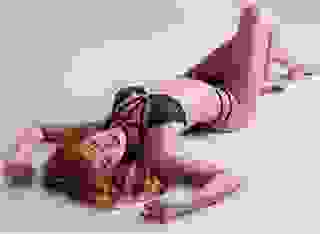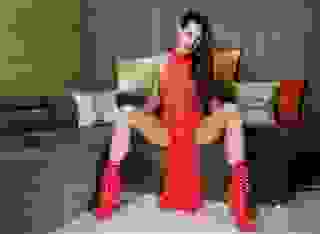- Sci-Fi & Fantasy
- Suhail Arrives in the West Ch. 02
Note: You can change font size, font face, and turn on dark mode by clicking the "A" icon tab in the Story Info Box.
You can temporarily switch back to a Classic Literotica® experience during our ongoing public Beta testing. Please consider leaving feedback on issues you experience or suggest improvements.
Click hereScene: Central City, 22nd century America.
The ideas in this story are merely fictions of the future. They are not meant to cause offence to anyone, whether Jewish, Muslim, 'western', 'eastern', religious etc. Read with an open mind.
I posted Chapter 5 of this story on Literotica in 2007 under the title of 'Discovery Of The Real America', in which the lead character was named Saurus. I have since decided to make his name more Arabic by calling him Suhail so anyone who reads this to chapter 5 should be aware of this.
Chapter 1 contains a lot of imagined history, but further chapters are less historical or political and include more sexual themes. This story is from the same scenario as my 'Watching The Zabernians' mini series in which the character Jasper from Chapter 5 / Discovery Of The Real America is the lead character. My story '22nd Century West: Apple and Citrus' (Group Sex) is also from the same world/period scenario.
*****
From Istanbul Suhail flew to Rome, and then without stopping to America, the heartland of the modern West. His destination was Central City, in the heart of America, a sprawling conurbation. This was where he was to be posted. He felt very alone when he came out of the airport and into the city streets. He was to make contact with other Eastern representatives and intelligence gatherers in their motel, but as he had some hours before the meeting time he decided to walk a few blocks towards the heart of the city. Like Istanbul the architecture was impressive, but not as old. Unlike older American cities such as Chicago and NewYork, which had the historical reputation of being the earliest 'skyscraper cities', central City was made of more 22nd century styles, not so tall and more relaxed in design, as befitted an America which was reputedly no longer 'growing' in the economic sense. There were connecting corridors between many of the taller or larger buildings carrying tramlines and walkways. By comparison both Istanbul and Baghdad were flatter, but they both had their taller buildings to show off. Many Eastern Federation cities, particularly in the Far East were today far taller than American cities.
In Central City the tall buildings were interrupted by large swathes of central parkland. Between the buildings Suhail glimpsed one in the distance, made into a hill, the famous concert arena, for which tons of earth had been moved to make a hill, so they could sink an arena and make the area look more interesting.
Suhail had placed his baggage with a courier and sent it to the hotel. In the meantime he wandered in the city. It was busy. There was a marked concentration of population here despite the lower birth rates. The Americans sat at bars chatting, open to the hot summer sun, which seemed to find its way down to the ground level despite the 'scrapers' looming above. They walked along the streets, strolling, window shopping, stopping to pass the time of day with people they knew, or maybe with strangers. The mass market excesses of the 20th and 21st centuries had been reversed and people no longer lived to shop because they had nothing better to do. Nonetheless there remained many shops selling a wide variety of produce. Suhail had read widely about the West. He believed he probably knew far more about its history than many of its own citizens.
Suhail met his Eastern Federation compatriots in the bar of the hotel at the allotted time. He occupied a seat at the end of the bar, as had been arranged. His 'colleagues' arrived, two of them, both muslim easterners. The mission manager was named Sadar, from Iran, and Abdan, an operative was from Pakistan. Saurus had met Abdan before, on a training course in Baghdad, and judged him to be a good man, a true muslim in this selfish world. He had to look twice to recognise him, because he had shaved off his beard, presumably to fit in with the prevailing fashions in the West, so he would not appear conspicuous.
Abdan displayed no hesitation in recognising him walking confidently towards him and offering his hand, "Hello my friend. It is good to meet you again." He was as genuine as ever. "Let me introduce you to Sadar. He has been in America for a few years, so he is the expert! He has shown me much since I arrived." Abdan spoke Arabic, which was not his native tongue. All three would be competent in English, otherwise they would not be here. It appeared that Sadar too must be competent in Arabic, which was encouraged as one of the main International languages in the East.
Sadar came forward and offered his hand. He was a fairly small, but strikingly handsome man. He flashed a pleasant smile, which encouraged Suhail, and said, "It is good to meet you at last. We have been looking forward to your arrival. How are matters in the East? We have been here for so long we begin to forget how things are at home."
"The East has not changed at all, certainly not since Abdan came out," replied Suhail. I have been in Baghdad, studying the West and the opportunities I will have here to further the Eastern cause. How long have you been out here?"
"Five years on this visit, but I had been out here a couple of years before that. That is plenty of time to become used to life out here. I enjoy being here, very much," said Sadar, a friendly twinkle in his eye. Suhail had expected a slightly more businesslike approach from this man, who had been organising Eastern networks here for so long. Why did he like it here in the West so much? Nonetheless his friendly charm was welcoming.
"Five years is a long time to be out here! Have you not been back for breaks or instruction periods?"
"No. Well the Department did offer to give me some breaks, but I was enjoying the work I do out here too much," said Sadar.
"What about your wife and family?" asked Suhail. "Have you not seen them for so long?"
"I decided to bring them out here to visit me. Every year they come out for a few weeks. I thought it would be good for them to see the West for themselves, but I suppose it is time for me to see Iran again. It has been a long time and I do miss it a little."
Suhail could not help thinking there was something a little odd about this man's 'enjoyment' of the West. It was almost as if he preferred the West and wanted to corrupt his family with it also. There was something a little unguarded about him, which immediately disturbed him. He seemed not to be concerned with the impression he was giving. Suhail told himself he must not be quick to judge, and at any rate the man was certainly likeable. He had heard nothing about the man before, except his name. Abdan was his official contact and instructor.
"What programs have you in place at the moment?" asked Suhail. Sadar looked like an efficient sort so Suhail decided to impress him with vocabulary which matched their status.
"Programs? Ah programs, I see," said Sadar uncertainly at first, but growing in understanding as his mind cast itself back to training sessions in Tehran and the language of Eastern management practice.
Suhail assumed that Sadar must be used to using new words, perhaps Western style words. "Do we have any teams in place, or any indigenous organisations operating."
"Of course, of course, we have a variety of them, but what you need to know is it has not been easy to set them up," explained Sadar. "And we don't have many operating effectively."
"That is not what the reports have been saying. I understood you had a wide variety of networks, and were making steady progress. What about the Brotherhood I have heard so much about? They are in all the cities of America, I understand, particularly amongst the Black people, keeping Islam alive and gaining converts every day."
"Well," said Sadar, "I wouldn't put it so strongly. Truth is they have been ailing recently. Young black men used to look to them for a set of principles in this place of greed and selfishness, and sometimes for justice, but they just don't seem to be attracted to it any more. They still have a lot of members, but there's nobody new under 30, and some of those are drifting."
Suhail shook his head, astounded by the news. "This is bad to know, but surely you have a plan for reversing this trend?"
"We're trying everything I assure you," said Sadar. "Advertising campaigns, but nobody watches or reads adverts any more and they aren't associated with fashionable morality here."
Sadar introduced Suhail to some of the teams and groups he had so far set up in Central City. He took him first to a religious commune in the country. Here the people were a mixture of faith backgrounds. Some were purists, others all embracing of more than one faith. Sometimes the groups disagreed. In the past these communities had been rivals, even enemies; christians, muslims, black, white, liberals, fundamentalists, evangelists, extreme anti masturbationists (known as Cherubians), and conventionalists. Members of this commune were hardly in the enthusiastic flush of youth, Suhail could not help noticing. Sadar explained, "Many of the young have run off from their parents. When they reach 18 or 21 they break away, choosing the attractions of the decadent society outside. The power of lust seems too great for these Western kids, even if their parents make every attempt to guide them in the cultural traditions of their forbears. When children do return they are welcomed with open arms. Many of the commune members have lost their religion or know little about it, but are united in their support of traditional values; pro nuclear family, pro stable society."
Another group, which also lived in a community out in the verdant country, were traditional, not religious. They lived not in a socialised commune, but in family groups, in separate houses and farmsteads, but they came together for communal meetings, entertainments and sometimes for semi-judicial gatherings. They apparently wanted a return to a more disciplined society. Some of the leaders whom Suhail met explained how they mourned the reduction of work in the West, because of the effects this had had, particularly on the young. "It has destroyed the soul of mankind here," said one of the ardent leaders. "I really admire you in the East, for your work ethic. You really work hard, and your people are so well behaved and polite!"
"I am pleased to find people in the West who look to us for the example we provide," replied Suhail. "We are not without or immoral, greedy or lazy people, I assure you, although I am sure that most of our citizens do follow the basic rules of a harmonious, moral and self disciplined society." In fact he was aware of many in the East who fell below these standards, but he did not wish to tarnish the image of the Eastern Federation amongst these allies in the West.
"Why would you say, has the workload been reduced so much here?" he asked, keen to receive the opinions of these Westerners, even though he knew some of the answers already.
"The nature and quantity of work has changed due partly to science, and partly to social and economic organisation. So the people have more free time now and work is a relative pleasure to many," said the ardent leader. "Trouble is they've forgotten how to work. They waste their time in bars, following senseless and childish hobbies. Sexual antics and drugs. People here have become very lazy. They're selfish and childish. The spirit has gone out of people."
"You see they managed to evolve a system where people were paid well for the work they did, so they did not have to do as much to maintain their standard of living," explained Sadar. "They also found they did not need to spend as much as they had before. The old sales tactics fell into disrepute, and it became more difficult to borrow money, so there was less to force people to work hard. The mortgage and property bubbles of the past were controlled more effectively by regulations and their enforcement. The concept of international trade was replaced by concepts of regional and localised trades. There were many changes of this type."
"You make it sound as if these changes were beneficial?" exclaimed Suhail, surprised at how positive his colleague was able to make the West's economic changes sound. He recognised the problems of today's East in his colleague's description of the past.
"Many of them were. The problem is that it weakened the moral strength and vitality of the society."
They went to a church near the centre of the city to meet its congregation informally, after a service. Suhail expected to see the pews full and the doors bursting, even in these spiritually deficient times. People would have a hunger for the soul, and for the word of God, to compensate for the self orientated luxury which persisted all around them. Would they not wish to wash away their sins, as Christian groups in the East did, even in the relatively secular modern times of his country. But when they arrived there were few people, mainly old congregants, who remembered less lascivious times when their buildings had been more full.
They spoke to the Minister of this particular church. "We have seen a gradual decline in the churches generally over the last hundred years or more. Occasionally groups of the young, resisting the stages of decline in our society would come in over the years I have been here, which is twenty years. They were family groups where the man and wife wished to bind each other closer together and prevent the dissolution of marriage which they felt would be the result of mixing and living too much among the irreligious and degenerate of the outside world. Recently there just haven't been very many of those types, which are the bedrock of our church. As you can see we're quite an old bunch at the moment."
"As you know, we're from the East," said Suhail, introducing himself properly to the minister. "Sadar is from Tehran, and I am Suhail from Baghdad. We want to link with groups in America to see if we can develop a moral counter revolution to the depravity of the modern West."
"It won't work you know," said the minister, "and particularly not if it is seen as being led from the East."
"Why not?" asked Suhail, alarmed by the statement.
"Because most people don't want it! Most people are actually very happy in their lives. We don't have to work very much. Technology does a great deal for us. In the last 100 years or so we have finally got the economic system sorted out. Instead of letting it rule us, we now rule it for our own benefit. We have never had it so good. Once we learned to disentangle all that old competitive stuff, which was pressurising our lives so much, and learned to relax, we started to enjoy life a lot more. Most of us are very relaxed and happy now," said the minister.
"I am very surprised to hear you, of all people, say that, minister. I thought religious men, such as yourself, would have only bad things to say about the modern West," exclaimed Suhail, disappointed to hear that even the minister seemed to applaud the decadent system.
"No. It doesn't follow, that just because Church attendance is very low, that we are in natural opposition to the modern system. The reality we accept is that in the 20th century people used to come to us for all sorts of reasons, because society, economics, friends were failing them, and because we provided a positive alternative. In that society of the past, which is incidentally, in many respects, much closer to your society of the East today. They needed Christianity, and the other religions, and many other competing organisations, philosophies and comforts. They needed them much more than they do today.
"And I'll tell you another thing. If Jesus Christ or Mohammed were to arrive in the late 20th century, look around, and then to travel here to the early 22nd century and look around, I think he would be very much more satisfied with what we have here than what we had then!"
- COMMENTS








